Yemen conflict: Terror of life under siege in Taiz
- Published
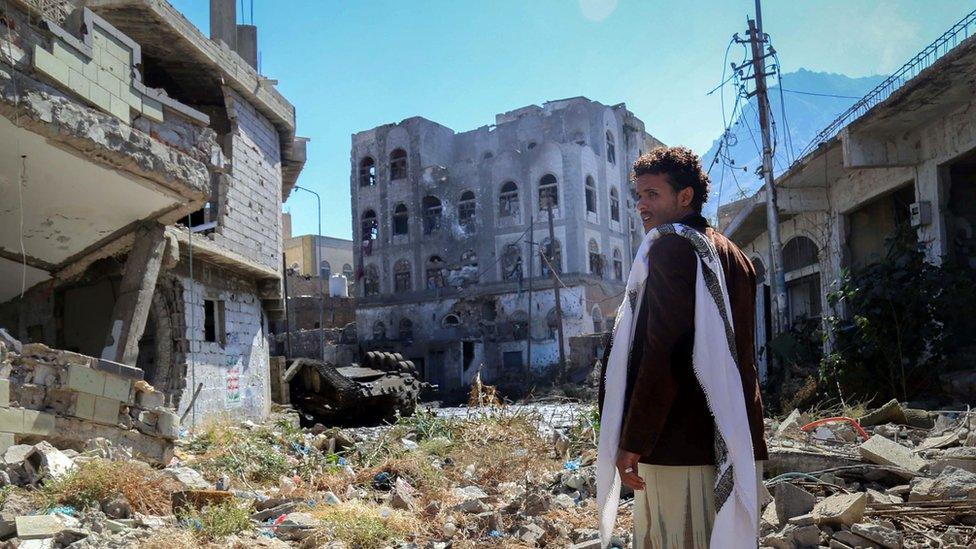
War has ravaged Taiz, Yemen's third city
In parts of Taiz, in south-western Yemen, snipers haunt the streets and open spaces. People there say bullets come from nowhere, with no warning.
In the back of his mind, Qays al-Radami was always aware of the danger, he said. He had grown used to cutting between houses and sticking close to walls as he moved around the city with his children.
But by the time Qays heard the bullet that killed his son last week, it was already too late. The round cut through the early afternoon sun and hit six-year-old Mohammed in the back, punching straight through his chest.


Qays dived for Mohammed and caught him before he hit the ground. He ran, cradling his son, to some local fighters who put the boy on the back of a motorbike and rushed him to hospital.
Barely able to walk from the shock, Qays returned home to his wife and eight-year-old daughter, and the hospital called soon after.
When Mohammed's mother heard, she ran into the street to the place her son had been killed and raised her arms in the air. "Shoot me! Shoot me, you son of a bitch! I want to die!" she screamed, before her husband could drag her inside.
"The sniper aimed at my son but really he shot me in the heart," said Qays. "He shot my heart. It is as if I am dead."
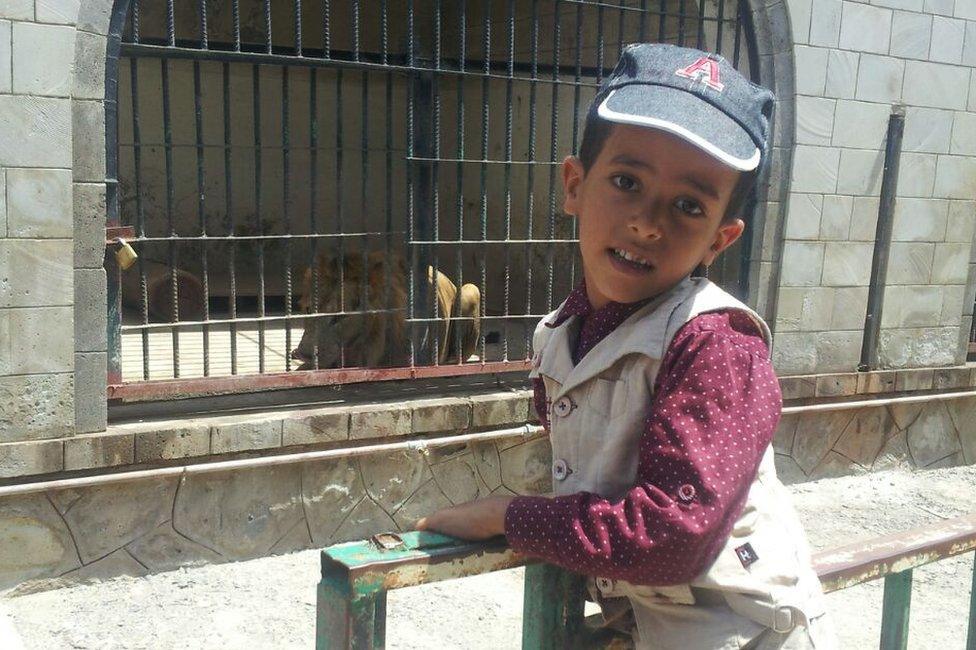
Mohammed al-Radami, who was shot dead aged six
A vicious ground war has brought terror to the streets of Taiz, Yemen's third-largest city and one of its most brutal conflict zones.
Access to international monitors and journalists is rare. Residents who spoke to the BBC by phone described snipers shooting at ordinary citizens, landmines exploding under children's feet and shells falling, relentlessly and indiscriminately, on homes.
On one side are members of the Zaidi Shia Muslim Houthi rebel movement and security forces loyal to the country's longtime former leader, Ali Abdullah Saleh. They seized control of much of north-western Yemen, including the capital Sanaa, in early 2015 and forced the internationally recognised government into exile.


On the other side of the conflict are soldiers loyal to President Abdrabbuh Mansour Hadi and predominantly Sunni Muslim southern tribesmen and separatists. With the help of a Saudi-led multinational coalition which has bombed swathes of the country, they have driven the rebels out of much of the south, but they have been unable to break the siege of Taiz.
For more than a year, the Houthis have besieged government-controlled districts from their positions around the city. They have been accused of indiscriminately shelling residential areas and medical facilities and restricting deliveries of aid.
Meanwhile, the pro-government fighters who control the heart of Taiz are alleged to have tortured, kidnapped and summarily killed their opponents.
Both sides, but particularly the Houthis, have been accused of using snipers against innocent civilians.
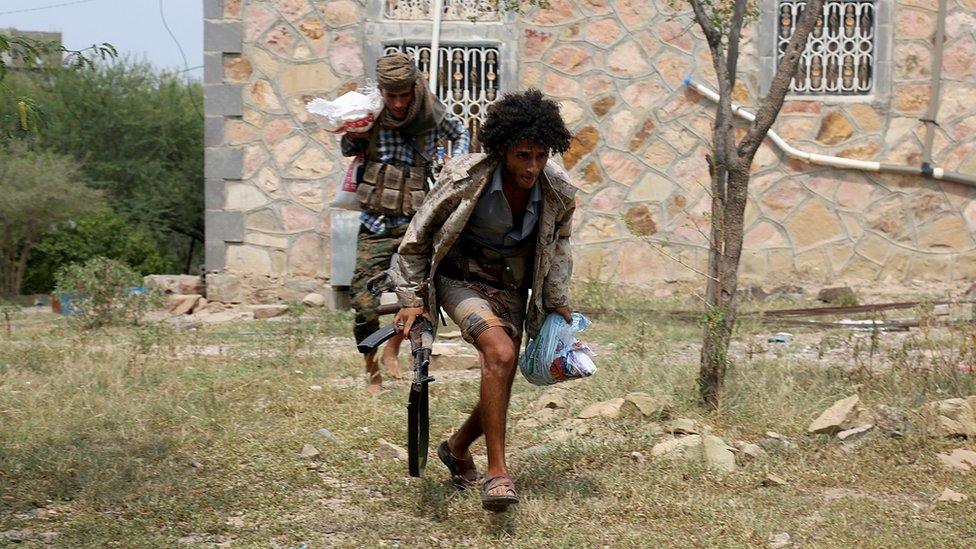
Hadi supporters are battling Houthi rebels for Taiz
Mwatana, an independent Yemeni human rights monitor, said in an extensive report on Taiz in August that it had found "appalling, grave human rights violations" in the city, including "killing, maiming, attacking medical staff and military recruitment of children".
The situation has become so dangerous that last week the International Committee of the Red Cross (ICRC) relocated its staff away from the city.
"Dead bodies are in the streets and people are unable to attend to their most basic needs," said Alexandre Faite, the ICRC head of delegation in Yemen, in a statement. "The situation is desperate."
'They shoot anything that moves'
You can sometimes tell a sniper's bullet from the path it takes through the body, said Satish Devkota, an MSF doctor based in Taiz.
"We see women and children who have been shot in the neck," he said. "They have entry wounds in the neck and exit wounds in the back, indicating they were shot from above."
Every day at the hospitals there are the bodies of civilians killed by single gunshot wounds to the head, neck and chest, he said. And the snipers there do not just shoot from the rooftops.
"The bullets also come from below, they come from the back, they come from everywhere," he said. "These people can be anywhere and they shoot at anything that moves - women, small children, even dogs."
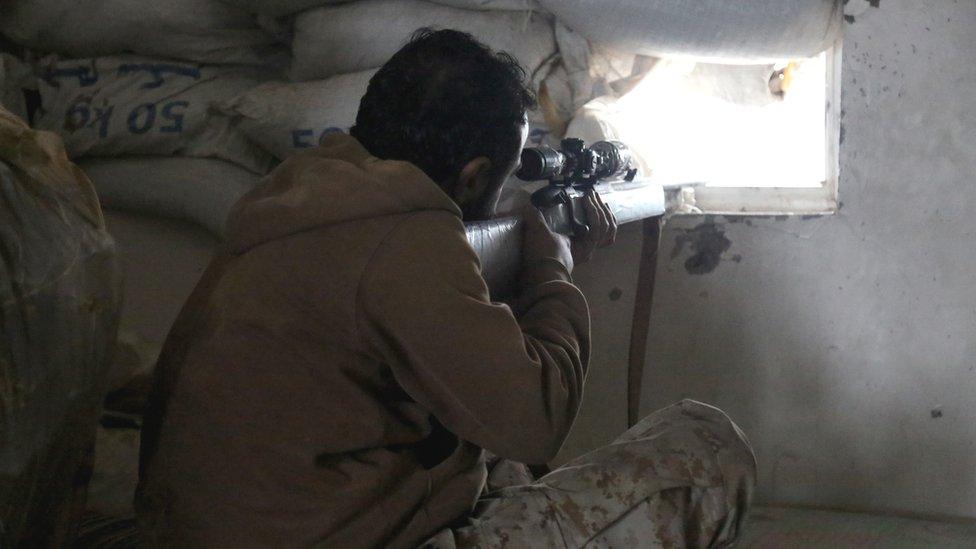
A sniper takes aim in the Kureyis region of Taiz
Landmines are also a constant fear for the civilians trapped in Taiz. As the front lines shift, fighters leave them in their wake, burying them in the shallow dirt or hiding them in empty buildings.
"I have seen civilians brought in in two pieces because they stepped on a mine," said Dr Devkota. "Civilians with their intestines coming out, civilians with their limbs blown off by the blast."
Dawood al-Wahbani, a 22-year-old media student from Taiz, was reporting for the amateur Taiz News Network when an improvised explosive device (IED) killed one of his fellow reporters and closest friends.
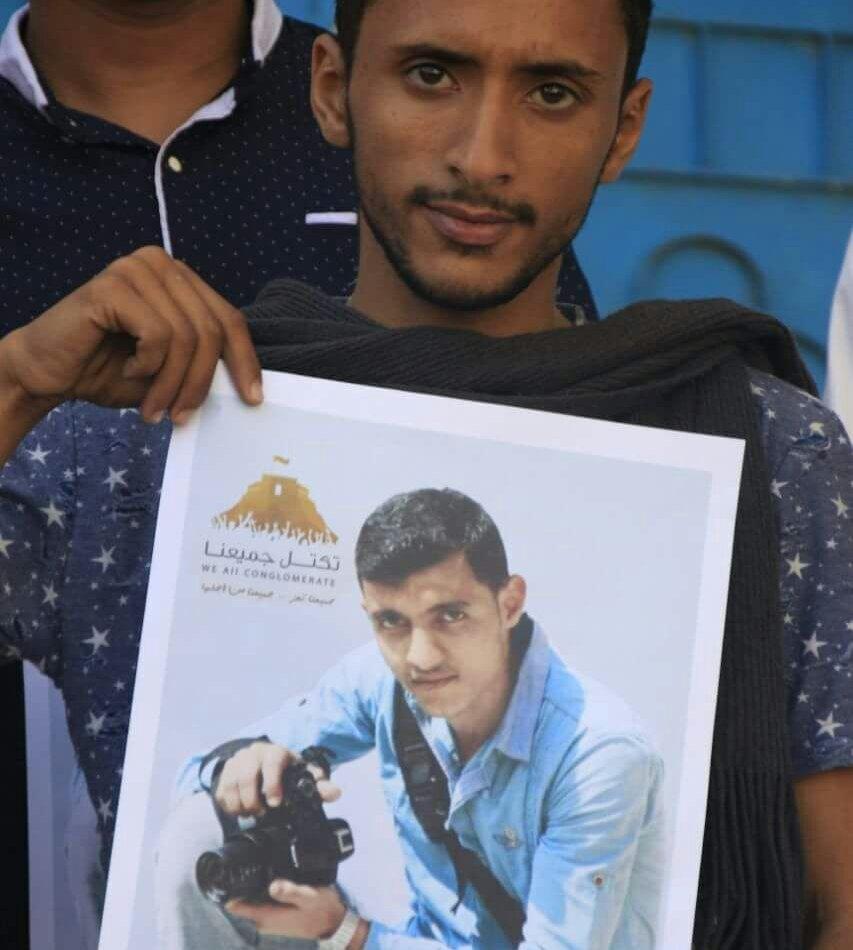
Dawood al-Wahbani holds up a picture of his friend Awab
Dawood and Awab were covering an advance by army troops at Taiz's eastern front when Awab walked ahead to photograph a damaged building. The blast of the IED, which Dawood believes was detonated remotely by a Houthi fighter, caused the building to collapse on Awab's head. Dawood found his friend's body under the rubble.
"In that moment I screamed out, an unnatural scream," he said. "I thought of him as a loving brother, I could not say no to him. It was the first time I had cried out like that. I cried out so loud that they heard me in the street."
'The ceasefire will fall on our heads'
Brief truces have brought respite to some parts of Yemen, but in Taiz they only worsen the violence, said residents and analysts.
"As soon as the ceasefires come into effect, the missiles come," said Dawood. "Missiles of all kinds. Howitzers, mortars, Katyusha rockets, different kinds of anti-aircraft missiles. See how I just listed all those kinds of missiles? Before the war I didn't even recognise a bullet."
Akram al-Shwafi, the head of Watch Team, an unofficial monitoring group in Taiz, said the same. "People here know that the ceasefire will fall on our heads," he said. "We say that they will sign the final truce with the blood of the sons of Taiz."

Both sides in Taiz have routinely ignored nationwide truces to pursue local battles and there is little confidence that another would bring a halt to the ground war.
"Even if there is a ceasefire brokered by the UN nationally, it's going to be impossible to stop the fighting on the ground in places like Taiz," said April Longley Alley, a Yemen analyst for the International Crisis Group.
"A peaceful resolution there has become more and more difficult as revenge is piled on revenge," she said. "Sectarian-tinged violence had taken root in and around Taiz, The fabric of the city has really been frayed."
Ms Longley Alley and other analysts laid the lion's share of the blame for abuses around Taiz with the Houthis and their allies. The city had seen "most clearly and for the longest period of time potential human rights violations by the Houthi and pro-Saleh forces", she said.
Mwatana, the Yemeni rights group, said in its report the Houthis were responsible for "the majority of indiscriminate and bloody attacks launched on residential areas" in the city.
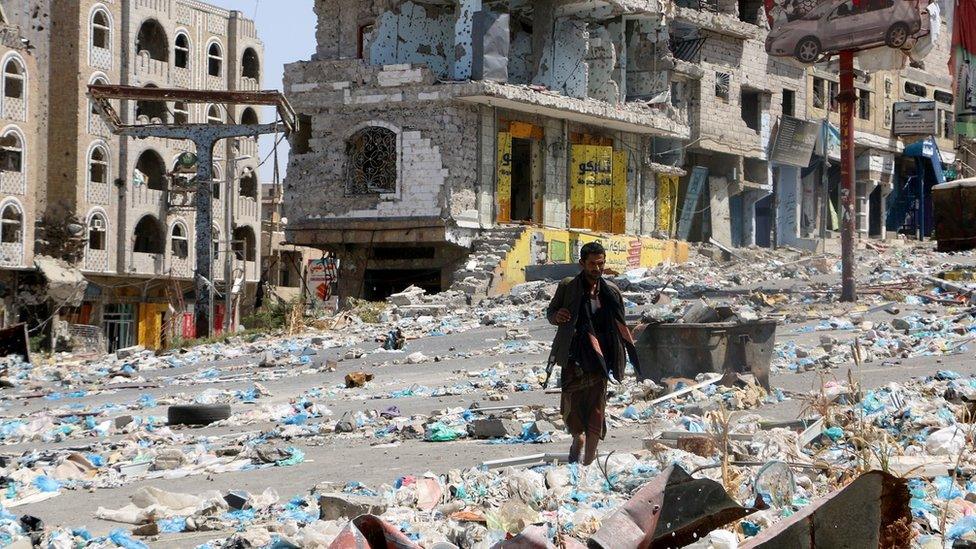
A pro-government fighter walks through the devastated Hasab area of Taiz
'Death is everywhere'
Just three years ago, Taiz was named as the official cultural capital of Yemen. Academics and authors called it home. It was awash with life.
Noha Qaid, a 22-year-old charity worker, grew up in the city, but her family home in the Salah neighbourhood is now a front line and the family is among the city's many displaced people.
"Everything has changed here now," she said. "I grew up around family and friends and it was peaceful, but people say now that you might go to work one day and never come back
"The worst thing you can do is go out in the streets. There are armed people everywhere, death is everywhere. There is no more culture, only death."
Meanwhile, Yemen is locked in a deadly stalemate. Peace talks have broken down and the latest attempted ceasefire has lapsed amid reported violations on both sides.
"I have lost hope now," said Noha. "At the beginning I was hopeful, but after everything I have seen I have lost it. I think now that even if one day there is peace, I may not be around to see it. All I see right now is death."